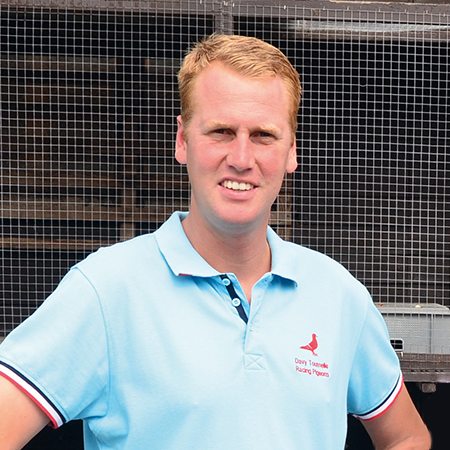10. January 2018
You just have to do it!!!
Impressive: born into a large family of fanciers and even as a little boy Davy wanted to be on the pigeon loft (before he could walk – according to his father Patrick). He started to race pigeons at the age of 16, and within a very short time, he had a super prize list.
The TOURNELLE family does everything for pigeon racing; pure effort and a winner’s mentality, otherwise, it’s not possible to achieve this kind of results. It all depends on punctuality, hygiene and perfect care. Luckily for them they have a good team. There’s father “Patrick”, who’s responsible for 80% for the care. Being a retired railway worker, he knows what hard work is. He readily accepts days of more than 12 hours to take care of the birds as perfectly as possible. Then there is also Davy’s mother Ann, who takes care of the “paper work” and helps out where she can. And then, there’s Davy himself, young, enthusiast and passionate, he fills the gaps and after his work, he makes sure that everything is done perfectly. He wants to participate in all distances and win from 100 to 800 km. And …. that is exactly what they go – in Rummen. You just have to do it, knowing that you can achieve top results just like that.
Caring for the birds in the Tournelle colony
The racing hens: here, although they prefer the difficult middle distance races – 450 to 550 km, they always have to keep an eye on the weather conditions. From the moment the summer hour starts, the hens have to train twice a day; in the morning from 5:45 to 6:35 and in the afternoon from 3:00 to 3:50. After the training, they receive a mixture of grit and 30 minutes after the training, they receive their feed. Experience has shown that the hens are much calmer then and they eat more.
The partners of the hens stay at home and each cock has two hens. When the hens arrive home from the race, they can get together with their cock after 30 minutes. Those that arrive first can be with their partner first for about 30 to 40 minutes. Then the hen moves to the resting compartment and the cock receives his second hen, also for about 30 to 40 minutes. So, they have to pay attention and make sure that everything goes well.
The racing cocks: these are raced using the system of classic widowhood. The hen stays at home and each cock has his own partner. At the beginning of the season – from March to the end of May, the cocks train twice a day; from 7:00 to 8:00 in the morning and from 5:00 to 6:00 in the evening. Once they participate in the long distance races, from Limoges (668 km) at the beginning of June, one training session a day is enough. Caution: as they take part in a minimum of 5 races varying from 668 to 750 km they have to work very hard!
The youngsters: a large group of young birds (approx. 300) have to prove their capacities! Work is the watchword here! They’re darkened up to the longest day and then they receive light from 5:00 in the morning to 11:00 in the evening. In the beginning, they are trained step by step and this job is performed by father Patrick, who drives them away often. As soon as they arrive home in a good condition, they continue with longer distances. In the second week of July, the hens and the cocks are separated and they are raced using the sliding-door system. From then on, they are driven by car once a week to a distance of 50 km, and on arriving home, they can stay together for 2 hours. Normally this is done on Wednesday, and on Thursday or Friday they have to leave for the race. After the race they can stay together for between 3 and 4 hours. They train once a day.
You can see that they spend hours with their feathered friends. The birds have to be trained virtually every moment of the day, and this involves a lot of work.
You cannot get results without investing a lot of effort. You need to work hard and – of course – you need good quality pigeons. This involves a lot of breeding and a strict selection.
A good and solid system
The Tournelle family like to use the Röhnfried products because of the scientific support they provide and their healthy nature.
Here too, they use a weekly ritual. A rather simple system but you need to follow it on a regular basis.
Saturday: on arriving home after the race, in their drinking water: Mumm (glucose = vitamin C) + Rotosal (provides them with extra oxygen and a fast recovery) + Bt-Amin Forte (a combination of amino acids, B vitamins and electrolytes)
Sunday: in their drinking water: Hexenbier (stimulates circulation) + Carni-Speed (carnitine ensures burning of fat in flight)
On the feed: a combination of Moorgold and K+K Powder, both in the morning evening. This ensures a good balanced digestive system, while the added protein builds up the muscles.
Monday: in their drinking water: Hexenbier + Carni-Speed
On the feed: in the morning Moorgold + K+K protein, in the evening: Moorgold + Entrobac and Immunbooster.
Tuesday + Wednesday: in their drinking water Blitzform + Carni-Speed
On the feed: only in the evening – Energy Oil + Ro 200 Condition Powder
Thursday: week 1 a Blitz Maxi Kraft tablet, week 2 a Flugfit tablet
Every three weeks, the pigeons receive a Rozitol drop in their nose to clear the respiration canals, and three times a week Avisana eye drops (before basketing, on

